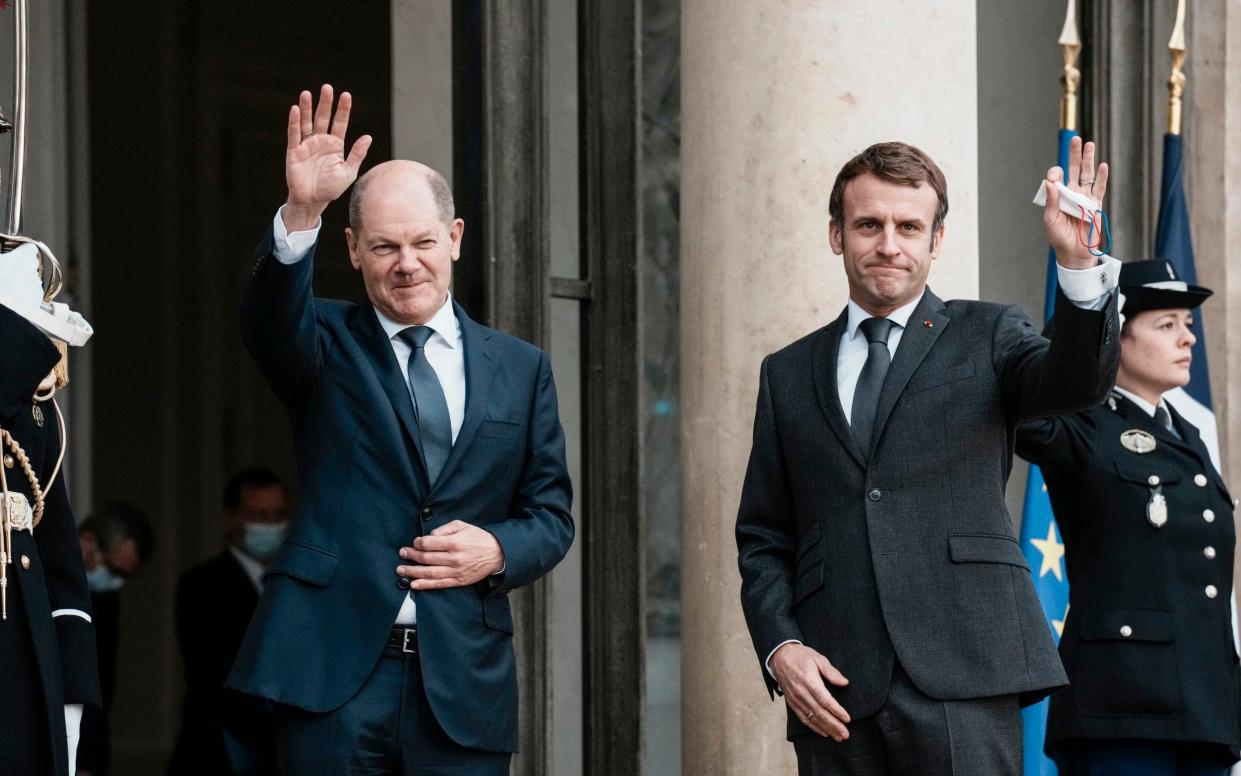Emmanuel Macron willing to sacrifice Western unity on Russia in his push for a stronger EU

Emmanuel Macron insists that the EU has an “important” role to play in deescalating tensions between Russia and the West over the possible invasion of Ukraine.
He has called for dialogue with the Kremlin and suggested that the EU could provide a plan to tempt Vladimir Putin towards peace.
He travels to Berlin on Tuesday for talks with Olaf Scholz, the German Chancellor, to agree a common position on Moscow and its muscle-flexing near the Ukrainian border, including on retaliatory sanctions.
Mr Macron’s critics claim his calls for dialogue with Russia undermine the unity of the West in the face of Mr Putin’s aggression.
But Mr Macron’s posturing is a clear case of the emperor’s new clothes - and the French president knows it.
The EU has never wielded the geopolitical heft necessary to broker peace with big beasts such as Russia.
It has arguably a single major foreign policy success to its name - the Iran nuclear deal, which was unceremoniously ditched by Donald Trump.
It is hobbled by the need for all 27 member states to agree to major foreign policy decisions, which makes it slow and vulnerable to being held hostage by a single country with an axe to grind.
Once it does get moving, the EU can impose punitive economic sanctions, as it did after the illegal annexation of Crimea from Ukraine in 2014.
But they have done little to change Mr Putin’s behaviour in countries such as Kazakhstan, Belarus, Moldova and Ukraine.
Ahead of April’s presidential elections, Mr Macron would welcome a diplomatic success that promotes his vision of an autonomous and sovereign “Europe that protects”.
When the two parts of the EU’s Franco-German engine move together, things usually start to happen in Brussels.

But Baltic nations are wary of undermining Nato’s influence and there is no guarantee of EU unity behind a Franco-German desecalation plan.
Mr Macron, who sees the EU as a vehicle to preserve and amplify French global influence, has his eyes on the long term.
If the EU is to make itself able to act independently of Nato and the US, as he desires, it must start acting like a distinct global player
Mr Macron is keen to dress the EU in the trappings of a superpower to convince member states to arm it with the necessary tools for a global heavyweight.
For Paris, that means agreeing plans for a 5,000 strong EU rapid reaction force, more cooperation on defence, and a common foreign policy strategy over the next five months of France’s term holding the presidency of the EU.
Mr Macron can also rely on Mr Scholz’s support for calls to replace EU foreign policy unanimity with a majority vote based on population, which would suit both countries.
On Wednesday in Paris, French and German officials will meet with Russian and Ukrainian representatives for talks.
If successful, it is hoped they could lead to a meeting between leaders. That would be a feather in Mr Macron’s cap after the EU was excluded from US-Russia talks in Geneva.
The omens aren't good. Mr Putin had previous ditched the so-called "Normandy format" talks becuase they could not deliver on his demands. The format was born during Franco-German led peace talks in Minsk, which, if Russia invades, will have proved to be a failure.
Like France, Germany is accused of being soft on Russia because of, among other things, the controversial Nord Stream 2 pipeline.
Mr Macron appears more interested in pushing his vision for the future of the EU than he is in presenting a united front to Mr Putin.
Mr Macron and Mr Scholz cannot meet Russia’s key demands over Ukraine, such as no Nato membership or missiles on its territory. It is simply not in their gift and most of the troops that Mr Putin wants withdrawn are American.
Mr Putin only respects strength and that means troops and by extension, the US and Nato.
He will however have no problem in holding talks with Mr Macron and Mr Scholz and will look to exploit any divisions among Western allies to his own advantage.

 Yahoo News
Yahoo News 
